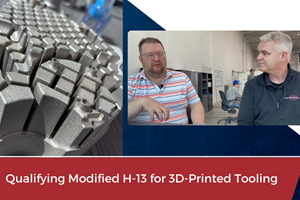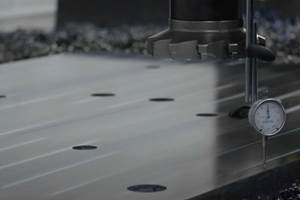Pre-hardened Tool Steel Saves Time and Money
Using NAK 55 standard mold bases allows moldmakers to focus on crucial core and cavity work.
When Tooling Express, Inc. (TEI) - a Bellevue, ID-based mold shop that specializes in sporting good molds - branched into the molding part of the business to further define its niche and improve its moldmaking process, it soon faced the challenge of finding a quality tool steel to work with that also would shorten deliveries by reducing machining times and post processes such as heat treating.
Located right outside of the ski resort area of Sun Valley, ID, this father/son moldmaking/molding shop employs four full-time toolmakers/mold designers. The shop is literally 15 minutes from the ski slopes, and summertime fly-fishing is a 10-minute walk from the shop's back door. It seems only natural that the company soon found its niche catering to the wide world of sports. With a 10,000-square-foot facility containing six injection molding machines ranging from 55 to 165 tons, TEI also has second operation facilities such as pad printing, ultrasonic welding, and minor assembly and packaging of its customer's products.
The Overmolding Challenge
According to Vice President Evan Downard, one of the company's earliest challenges involved building a mold for over-molded ski pole grips. "It had only been done once before and our new customer wanted to get very aggressive with the shut-off shapes that would show the secondary color on the grip," Downard explains. "We quickly realized that the only way to ensure success with the project was to also control the final injection molding process. So, eight months into our endeavor as a moldmaking shop, we also found ourselves as injection molders. Our huge success with this particular over-mold job quickly lead to other jobs and helped us realize that this is our niche in the industry."
The object of overmolding - or insert molding - is to place either a metal or plastic item into a mold and close on it. "This is something that most injection molders try to avoid," Downard explains. "But here we are in our own private Idaho, doing it all day long on purpose.
"A big problem with insert molding is the fact that you are actually closing the mold on pre-molded parts or some other insert material," Downard continues. "In the past, we have relied heavily on heat treated tool steels to take on the task of pinching off on insert material and still leave shut-off surfaces intact. Taking the problem one step further, there is often a need to do additional machining on mold surfaces to fine-tune the pinch off areas."
Standard Mold Bases/Inserts Speed Delivery
Downard found the solution he was seeking at International Mold Steel, a Florence, KY-based supplier of pre-hardened mold steels and a new line of MUD-style mold inserts. The company's off-the-shelf NAK 55 MUD style bases were the best fit for TEI's needs. "Since a large portion of our molds are built in this style base, and the fact that we can more efficiently cut NAK 55 over the other available pre-hardened mold bases, this is what we were looking for," Downard comments. "The price may be a bit higher, but we quickly make up for that additional cost by having the ability to finish molds earlier due to faster machining and less time spent on any unnecessary heat treating. In addition, we don't need to post-grind the inserts."
Plus, the quick-change inserts load in and out of a master frame that can be reused over and over again, eliminating the need for each mold to have its own "A" support plate and "B" side ejection box or U-frame. "This obviously offers some cost savings due to fewer materials being needed, but more importantly, it allows the moldmaker to focus on the more highly detailed core and cavity work," Downard explains.
The greatest challenge of this type of work, he continues, is that most often there is no real life part geometry to work from. A customer's only concern is that it works and achieves the desired look when assembled. When components for the final assembly are being made all around the world with no real hard numbers to call law, quite often final "tweaking" is necessary. For this reason, weldability of the mold insert material is crucial, and Downard points out that it can be welded without any evidence of the weld on the part.
"In our latest endeavor of overmolding plastic attachment points to the ends of goggle straps, the NAK 55 mold bases have really shined," Downard adds. "Due to the perfect timing on delivery of the mold bases and the ability to machine faster with minimal polishing, we were able to get our customer's new concept products online in time for them to take actual production parts with them to a recent trade show."
Related Content
VIDEO: Qualifying Modified H-13 for 3D-Printed Tooling
Next Chapter Manufacturing and International Mold Steel discuss their partnership to qualify a modified H-13 for tooling applications.
Read MoreVIDEO: Innovative Materials Boost Mold Efficiency
Advancements in metal 3D printing and stainless steel optimize mold building for diverse, high-demand industries.
Read MoreQualified Tool Steel Enhances Thermal Transfer, Long Tool Life
Next Chapter Manufacturing has successfully qualified HTC-45 tool steel, an optimized version of H13, to support better thermal transfer and faster cycle times for molders and die-casters.
Read MoreHow to Produce More Accurate Molds and Reduce Rework
Patented micro-milling process for manufacturing steel plate flat and parallel helps mold builders shorten mold build times and increase accuracy.
Read MoreRead Next
Are You a Moldmaker Considering 3D Printing? Consider the 3D Printing Workshop at NPE2024
Presentations will cover 3D printing for mold tooling, material innovation, product development, bridge production and full-scale, high-volume additive manufacturing.
Read MoreHow to Use Strategic Planning Tools, Data to Manage the Human Side of Business
Q&A with Marion Wells, MMT EAB member and founder of Human Asset Management.
Read MoreReasons to Use Fiber Lasers for Mold Cleaning
Fiber lasers offer a simplicity, speed, control and portability, minimizing mold cleaning risks.
Read More




















